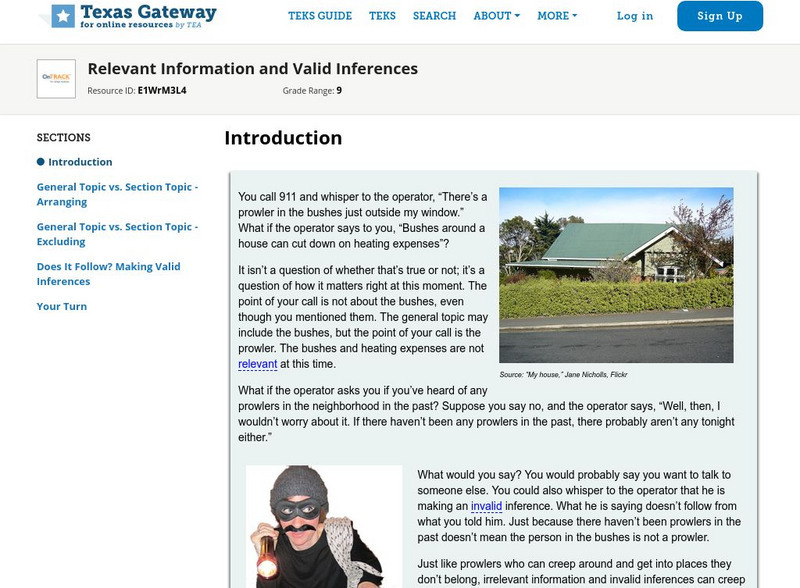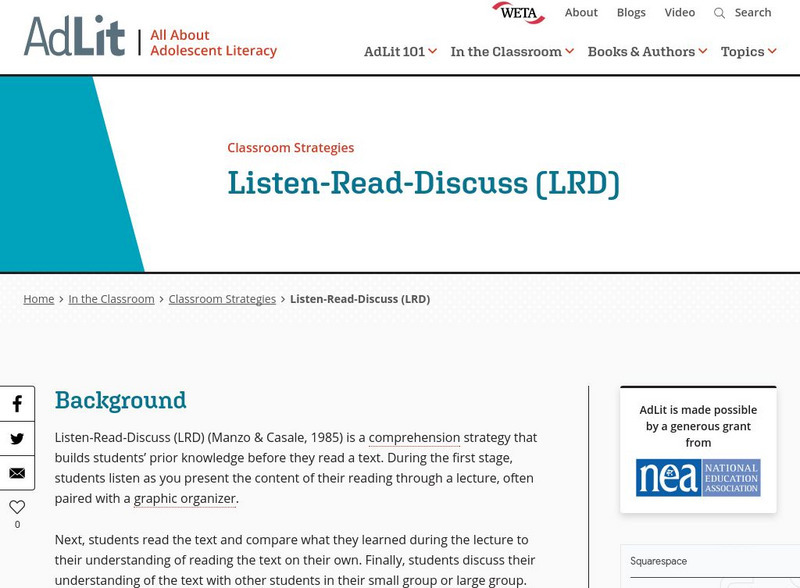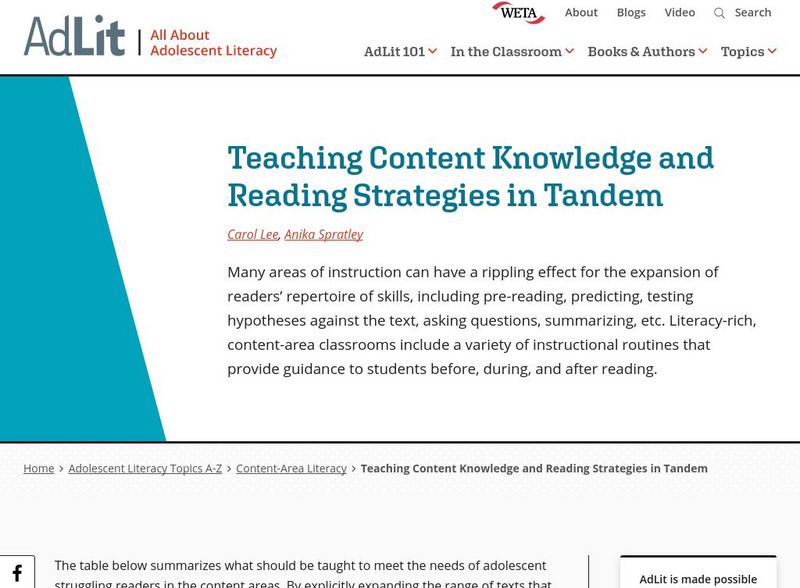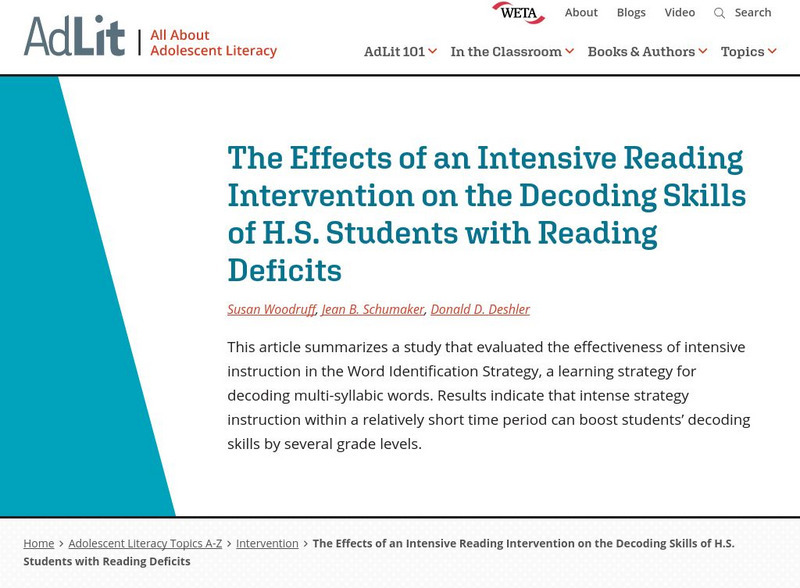Sophia Learning
Sophia: Critical Reading as a Learning Strategy
This tutorial focuses on critical reading using a downloadable PowerPoint presentation, "Critical Reading 101," which includes separating fact from opinion, 6 propaganda techniques, and 6 common fallacies in reasoning. Also provided is...
Texas Education Agency
Texas Gateway: Relevant Information and Valid Inferences
[Accessible by TX Educators. Free Registration/Login Required] You will be able to write an essay that contains relevant information and valid inferences. W.9-10.2 Informative
CommonLit
Common Lit: Financial Literacy
CommonLit.org is a wonderful resource to use in a Language Arts classroom. Each story or article is accompanied by guided reading questions, assessment questions, and discussion questions. In addition, students can click on words to see...
Other
Warren County Schools: Citing Textual Evidence
Well-organized and in-depth lesson on citing textual evidence and understanding inferences. Many examples are included, as well as exercises for the students to practice what they have learned. [PDF]
AdLit
Ad lit.org: Classroom Strategies: First Lines
First Lines is a strategy in which students read the beginning sentences from assigned readings and make predictions about the content of what they're about to read. This pre-reading technique helps students focus their attention on what...
AdLit
Ad lit.org: Classroom Strategies: Listen Read Discuss (Lrd)
Listen-Read-Discuss (LRD) (Manzo & Casale, 1985) is a comprehension strategy that builds students' prior knowledge before they read a text. During the first stage, students listen as you present the content of their reading through a...
AdLit
Ad lit.org: Classroom Strategies: Inferential Reading
Teaching students to "read influentially" helps them learn how to read more strategically. This technique is derived from the teaching model that learners develop knowledge via the process of interpreting new information in light of past...
AdLit
Ad lit.org: Explicit Comprehension Strategy Instruction
Use explicit strategy instruction to make visible the invisible comprehension strategies that good readers use to understand text. Support students until they can use the strategies independently. Recycle and re-teach strategies...
AdLit
Ad lit.org: Extended Discussion of Text Meaning and Interpretation
Teachers should provide opportunities for students to engage in high-quality discussions of the meaning and interpretation of texts in various content areas as one important way to improve their reading comprehension.
AdLit
Ad lit.org: Five Areas of Instructional Improvement to Increase Academic Literacy
How can content-area, non-reading-specialist teachers contribute to academic literacy? They can incorporate these five techniques throughout their lessons: (1) provide explicit instruction and supported practice in effective...
AdLit
Ad lit.org: Teaching Content Knowledge and Reading Strategies in Tandem
Many areas of instruction can have a rippling effect for the expansion of readers' repertoire of skills, including pre-reading, predicting, testing hypotheses against the text, asking questions, summarizing, etc. Literacy-rich,...
AdLit
Ad lit.org: Content Area Literacy: Science
The demands of comprehending scientific text are discipline specific and are best learned by supporting students in learning how to read a wide range of scientific genres. Besides text structures emphasizing cause and effect, sequencing...
AdLit
Ad lit.org: Effects of Intensive Reading Intervention of Decoding Skills
This article summarizes a study that evaluated the effectiveness of intensive instruction in the Word Identification Strategy, a learning strategy for decoding multi-syllabic words. Results indicate that intense strategy instruction...
E Reading Worksheets
E Reading Worksheets: Summarizing Worksheets and Activities
In this instructional resource, students will learn more about summarizing texts. Worksheets and PowerPoint lessons are provided to reinforce understanding about ways to summarize nonfiction texts and to identify main ideas. This module...
Wisconsin Response to Intervention Center
Wisconsin Rt I Center: Close Reading [Pdf]
Teachers will learn about the importance of close reading. Teachers will learn how to implement close reading; measure progress of close reading; and find research to support close reading. A list of close reading activities are also...
Polk Brothers Foundation Center for Urban Education at DePaul University
De Paul University: Center for Urban Education: I Can Infer Character Traits and Support [Pdf]
Students can use this graphic organizer while making inferences about characters in a story or history text. Students will collect text evidence in the chart to support their character trait inferences.
Other
Text Help: Middle Grades Informational Text [Pdf]
A useful resource with ideas for teachers to meet the Common Core Standard 8.3 for informational text. The ideas are designed for use with the program Read and Write Gold, but could be implemented on paper.
ReadWriteThink
Read Write Think: Questioning a Comprehension Strategy for Small Group Reading
Contains plans for three lessons about asking the right questions while reading. After the teacher explains the difference between factual and inferential questions, students practice using them in small-group guided reading. In addition...
Other
English Companion: Reading Expository Text
Taken from "Reading Reminders: Tools, Tips, and Techmiques," the information on this website provides advice on how to read, understand, analyze, and write expository texts.
International Reading Association
Reading Online Articles: Comprehension Instruction
An article on improving reading comprehension through time-tested strategies as well as a summary of new hypotheses about effective comprehension instruction.
Reading Rockets
Reading Rockets: Strategy Guide: Teaching How Scientists Make Inferences [Pdf]
This guide includes an introductory section about visual evidence, a general overview of how to use this strategy with many science texts, and a plan for teaching how to use visual evidence to make inferences with the Seeds of...
Wisconsin Response to Intervention Center
Wisconsin Rt I Center: Cloze Passage [Pdf]
Classroom teachers will learn about cloze passages, a contextual analysis instructional strategy. Teachers will learn how to implement cloze passages, understand how to measure progress with cloze passages, find research that supports...
Michigan State University
Michigan State University: Intervention for Reading: Paraphrasing
Improve understanding of expository materials by getting the main ideas through paraphrasing. The paraphrasing strategy helps learners recall the main ideas and specific facts of materials they read. There are three steps for teaching...
Other
Prezi: Inference Lesson 8th Grade
Learn what it means to make an inference by combining the author's clues and your background knowledge.














